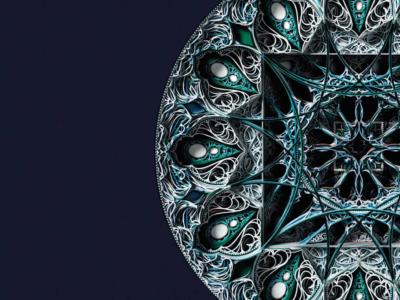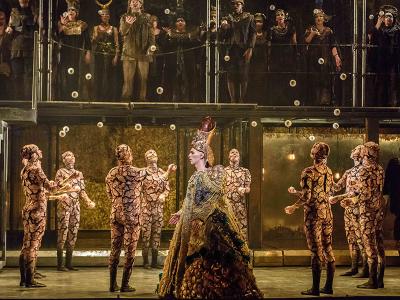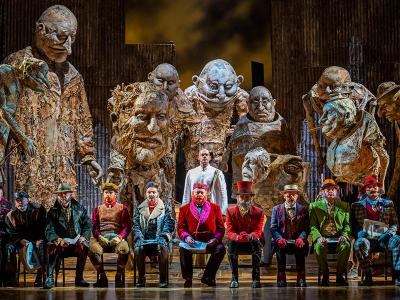The Beginner's Guide to Philip Glass
Often regarded as one of the most influential musicians of the twenty-first century, American composer Philip Glass is best-known for his minimalist compositions. With famous operas including Akhnaten and Satyagraha, Philip Glass’s music may be minimalist, but his productions are epic, and a must see for any opera fan! But let’s discover more about the man behind the unique sound…
He is a minimalist composer
Video
Minimal music is a modern style of classical music, developed in the early 1960s by the likes of Glass and his contemporaries, Steve Reich and Terry Riley. The minimalist opera genre is best categorised by its use of repetitive sounds over long periods, which has a hypnotic, meditative feel. Although his works can be described as minimalist, Glass prefers to describe himself as a composer of ‘music with repetitive structures.’
Listen to the music in this trailer of the ENO production of Glass’s Akhnaten to hear for yourself.
The hypnotic structures of Indian music inspired many of his works
Video
In the mid-1960s, Glass met Indian musician Ravi Shankar (the man who introduced The Beatles’ George Harrison to psychedelic music). Hired as an assistant, it was Glass’s job to transcribe Shankar’s music in a way that western musicians could play. At the time, Indian music was unfamiliar to many westerners, meaning few had transcribed the hypnotic melodies of eastern music.
Immersing himself in the addictive structure of Indian music lead to Glass journeying around India, the Himalayas and North Africa. It was his first trip to India, in 1966 that inspired Glass to create an opera on Mahatma Gandhi. Satyagraha (an ancient Indian word meaning ‘truth-force’) premiered in 1980.
Since then, Satyagraha has blown opera audiences away with its epic staging and Sanskrit vocals – with the upcoming 2021 production being ENO’s fourth revival. Book your opera tickets to ENO’s 2021 production to experience Satyagraha live at the London Coliseum.
His trilogy of ‘portrait operas’ are like nothing you’ve ever seen before
Video
Throughout his career, Glass has composed more than 25 operas. Out of all his operas, the three ‘portraits’ are some of the best known. The first in the series, Einstein on the Beach, premiered in 1976, pushing minimalism into the mainstream. This Philip Glass (as with the others in the trilogy) focuses on a major historical figure, in this case, the famous scientist. The piece has neither dialogue nor a narrative, and Einstein himself is played by a violinist.
Four years later, Satyagraha, an opera on a much larger scale, was premiered. This time Gandhi is the focus of the work, specifically his early years in South Africa and his approach to non-violent protest. The non-conventional libretto is loosely based on texts from the Bhagavad-Gita, a scripture in the ancient Hindu language, Sanskrit. Satyagraha was Glass’s first major work to use a traditional orchestral line-up and cast of soloists.
Video
The final opera in the trilogy, Akhnaten, was first performed in 1984 and draws on the life of the eponymous ancient Egyptian Pharaoh. Glass’s opera about ‘religion, orthodoxy and reaction’ is inspired by the reading of Freud’s Moses and Monotheism and Velikosvsky’s Oedipus and Akhnaten.
As with the other operas, Philip Glass’s Akhnaten doesn’t follow a conventional narrative as the story is told through a series of tableaux. Also true to Glass’s form, the opera consists of various languages and dialogue rooted in ancient texts – including the Book Of The Dead (an ancient Eygyptian funerary text).
He also writes music for films
Video
Glass began composing music for film in the 1970s, when he scored a number of documentary films. In 1982, he worked on American experimental film Koyaanisqatsi, his score plays almost uninterrupted for the duration of the film. Pre-existing and original compositions can be heard in 1998’s The Truman Show, and also in the horror film The Candyman.
Glass also has a cameo in the film. Have a watch of the video to see him playing the piano whilst Truman sleeps. He is perhaps best known, however, for writing music for the 2002 film, The Hours, staring Nicole Kidman, Meryl Streep and Julianne Moore. It was for this work that Glass won the BAFTA award for best film music.
To find out more about the life and works of Philip Glass, check out his composer page or read our introductory guides to Satyagraha and Akhnaten.



